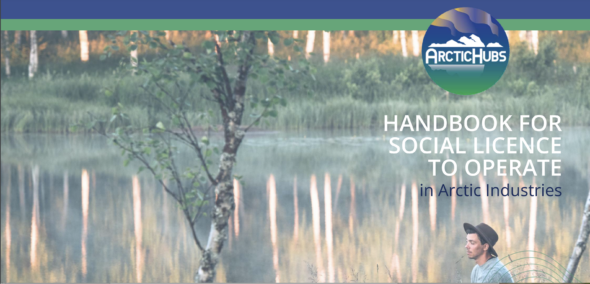In the Arctic, balancing economic growth with environmental sustainability and community needs is crucial for achieving long-term success. The latest ArcticHubs report introduces a comprehensive Handbook for Social Licence to Operate (SLO) in Arctic Industries, which aims to support sustainable Arctic industries in earning the trust and acceptance of local communities—an essential factor for successful operations in these fragile environments.
The concept of Social Licence to Operate (SLO) goes beyond formal permits or regulatory compliance. It involves gaining the informal yet critical approval of local communities, including indigenous groups, for activities such as mining, aquaculture, forestry, and tourism. Failure to achieve SLO can result in project delays, disruptions, or even shutdowns, underscoring its importance for sustainable Arctic development.

Why Social Licence to Operate Matters in the Arctic?
The Arctic presents unique challenges for industries due to its complex socio-ecological context. It is home to both rapidly growing new industries like large-scale tourism and traditional livelihoods such as reindeer herding and Inuit fishing. These diverse activities often compete for the same land and seascapes, leading to conflicts between traditional and modern uses. Achieving SLO is crucial for balancing these conflicting interests and ensuring that both new and existing industries can thrive while respecting the rights and cultures of local and indigenous communities.
The ArcticHubs project has adapted the SLO concept—originally developed in the mining sector—to other key Arctic industries. This adaptation helps industries understand how to build trust and engage meaningfully with local communities. The handbook provides practical recommendations, emphasizing genuine dialogue, community involvement, and respect for indigenous rights.
Key takeaways from the ArcticHubs SLO handbook
- Community Engagement is Crucial: To gain a social licence, industries must engage with all relevant stakeholders, from local citizens and indigenous groups to policymakers. The handbook emphasizes moving beyond mere formalities and focusing on genuine, transparent communication and relationship building.
- Balancing Economic and Environmental Sustainability: Industries must strike a balance between generating economic benefits and minimizing environmental impacts. For instance, in mining or forestry, respecting indigenous land rights and ensuring sustainable practices are vital to gaining community trust.
- Respecting Indigenous Rights: The ArcticHubs project highlights the importance of recognizing indigenous land use and ensuring their rights are respected in any industrial activity. For example, reindeer herders often need special considerations to avoid disruptions to their traditional grazing routes.
- Adapting SLO Across Industries: The handbook demonstrates how SLO principles can be adapted to different Arctic industries. Whether it’s aquaculture in the Westfjords of Iceland or tourism in Greenland, the need to involve and respect local communities remains constant.
The handbook also shows how SLO principles can be adapted to different Arctic industries. Whether it’s aquaculture in the Westfjords of Iceland or tourism in Greenland, the need to involve and respect local communities remains constant.
Building a sustainable future together
Achieving SLO is not just about meeting local expectations—it’s about creating shared value and a long-term vision for sustainable development. The ArcticHubs handbook provides a roadmap for industries to engage effectively with communities and contribute positively to Arctic societies.
To learn more, explore our full report and discover practical examples of how SLO is being implemented in different Arctic hubs. Together, we can foster a future where industry and community thrive side by side.
For more details, visit ArcticHubs Project Results.
